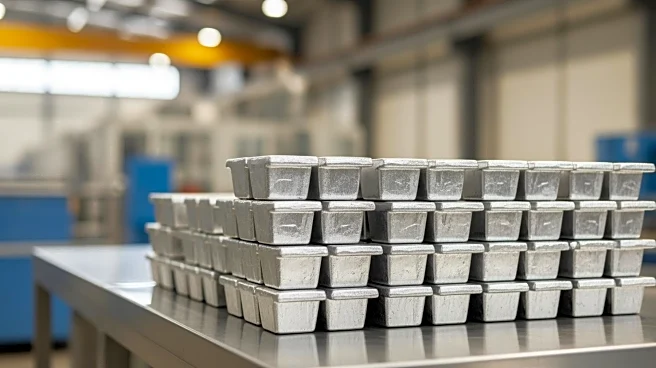What's Happening?
Russian aluminium producer RUSAL has signed a Memorandum of Understanding with Ethiopian Investment Holdings to develop a large-scale aluminium smelter in Ethiopia. The plant is planned to have an annual
capacity of 500,000 tonnes, with the first phase of the project estimated to cost $1 billion. Financing for the project is expected to come primarily from debt partners, who have shown strong interest. The construction is projected to take three to four years, and the plant is expected to operate for up to 50 years. This initiative aligns with Ethiopia's strategy to reduce foreign-exchange outflows related to aluminium imports and aims to position the country as a competitive supplier in regional and global markets.
Why It's Important?
The development of the aluminium smelter in Ethiopia is significant as it could transform the aluminium production landscape in Africa, which currently has limited smelting capacity despite vast bauxite reserves. The project is poised to create East Africa's first major aluminium refining hub, enhancing the continent's production capacity and diversifying its industrial footprint. This move also strengthens Africa's role in the global aluminium market, which is expected to grow by 40% by 2030. Additionally, the project deepens Russia's economic presence in Africa, reflecting Moscow's strategic push for influence in the region amid shifting geopolitical alignments.
What's Next?
The next steps involve site identification and a comprehensive feasibility study to ensure the project's development progresses on schedule. If the smelter reaches full operational capacity, it could reshape the aluminium value chain in East Africa and offer opportunities for downstream industries and regional economic development. The project may also lead to increased competition for mineral resources in Africa, with Russia and China capitalizing on weakened Western investment flows.
Beyond the Headlines
The Ethiopian smelter deal highlights Russia's growing appetite for strategic economic influence across Africa, as Western financing and political engagement have receded. This investment is part of a broader trend where Russia is accelerating partnerships in mining, energy, and industrial processing across the continent. The deal underscores the shifting geopolitical alignments and the competition for long-horizon industrial projects in Africa.









